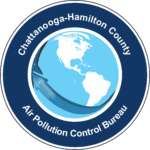Residents
The Air Pollution Control Bureau, founded in 1969, strives to administer local air pollution control laws that are intended to achieve and maintain such levels of air quality as will protect human health and safety and to the greatest degree practicable, prevent injury to plant and animal life and property, and foster the comfort and convenience of the people. The Air Pollution Control Board guides the Bureau’s initiatives to maintain clean air for our community. This board is made up of 10 members: three county appointed members, three city appointed members, three jointly appointed members and a representative from the Chattanooga-Hamilton County Health Department.

